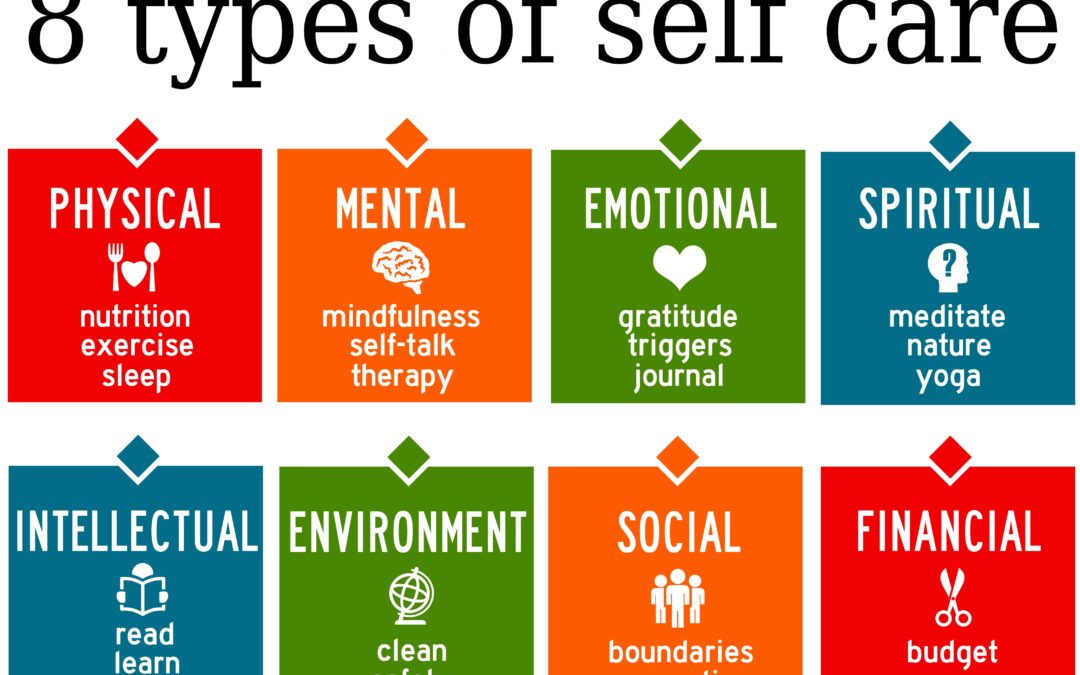At Scottsdale Recovery Center, we believe in the transformative power of self-care in promoting overall well-being and supporting individuals on their journey to a life free from alcohol and drugs. Typically, self-care is broken up into 8 areas of life, each addressing a different facet of our being—physical, mental, emotional, spiritual, intellectual, environmental, social, and financial. By incorporating self-care practices into these areas, individuals can cultivate a balanced and fulfilling life.
Let’s delve into each type and explore ideas for self-care within each domain.
I. Physical Self-Care:
- Exercise and Movement: Engage in regular physical activity such as walking, jogging, yoga, or dance to promote fitness, reduce stress, and enhance overall well-being.
- Adequate Rest and Sleep: Prioritize a consistent sleep routine, aiming for 7-9 hours of quality sleep each night to promote physical recovery and mental clarity.
- Energize and recharge: whether at home or in a professional medspa setting, spa days can be a great way to maintain self-care levels.
- Nutritious Eating: Nourish your body with a balanced diet rich in fruits, vegetables, lean proteins, and whole grains. Stay hydrated by drinking plenty of water throughout the day.
II. Mental Self-Care:
- Mindfulness and Meditation: Incorporate mindfulness practices and meditation into your daily routine to cultivate present-moment awareness, reduce stress, and enhance mental clarity.
- Relaxation Techniques: Explore relaxation techniques such as deep breathing exercises, progressive muscle relaxation, or guided imagery to reduce anxiety and promote a sense of calm.
- Intellectual Stimulation: Engage your mind through reading books, solving puzzles, learning new skills, or pursuing hobbies that challenge and stimulate your intellect.
III. Emotional Self-Care:
- Emotional Awareness: Practice self-reflection and develop emotional intelligence by recognizing and acknowledging your emotions without judgment.
- Journaling: Maintain a journal to express and process your emotions, thoughts, and experiences. This helps promote self-awareness and emotional well-being.
- Seek Support: Reach out to trusted friends, family members, or a therapist to discuss your feelings and concerns, fostering emotional connection and support.
IV. Spiritual Self-Care:
Mindful Practices: Engage in activities that foster a sense of connection to something greater, such as meditation, prayer, or spending time in nature.
Cultivate Gratitude: Practice gratitude by reflecting on the things you appreciate in your life. Consider keeping a gratitude journal or sharing gratitude with others.
Engage in Meaningful Activities: Participate in activities that align with your values and provide a sense of purpose, such as volunteering, practicing acts of kindness, or engaging in creative endeavors.
V. Intellectual Self-Care:
- Lifelong Learning: Continuously expand your knowledge and skills through reading books, attending workshops or webinars, taking courses, or engaging in online learning platforms.
- Stimulating Conversations: Seek out stimulating conversations with friends, colleagues, or mentors to explore new ideas, perspectives, and knowledge.
- Creative Expression: Engage in creative outlets such as painting, writing, playing a musical instrument, or engaging in crafts to stimulate your intellect and tap into your creativity.
VI. Environmental Self-Care:
- Declutter and Organize: Create a clean and organized living and working space to promote a sense of calm and productivity.
- Nature Connection: Spend time in nature, whether it’s taking walks in the park, gardening, or enjoying outdoor activities to foster a sense of connection and rejuvenation.
- Healthy Environment: Ensure your living and working environments support your well-being by minimizing exposure to toxins, maintaining good air quality, and creating spaces that promote relaxation and inspiration.
VII. Social Self-Care:
- Nurturing Relationships: Cultivate meaningful connections with friends, family, and supportive individuals who contribute positively to your life.
- Quality Time: Dedicate time to spend with loved ones, engaging in activities that promote connection, laughter, and shared experiences.
- Boundaries and Communication: Establish and maintain healthy boundaries in your relationships, and practice effective communication to foster healthy interactions.
VIII. Financial Self-Care:
- Budgeting and Financial Planning: Create a budget to manage your finances effectively and plan for the future, reducing stress and promoting financial well-being.
- Debt Management: Take steps to reduce debt and establish healthy financial habits, such as seeking professional advice, setting financial goals, and practicing responsible spending.
- Identify Your Values: Reflect on your values and align your financial decisions with those values. Focus on what truly brings you joy and prioritize spending in line with your values.
Embracing the eight types of self-care
By embracing the eight types of self-care—physical, mental, emotional, spiritual, intellectual, environmental, social, and financial—you can create a holistic and fulfilling lifestyle that supports your journey towards lasting wellness and sobriety.
Remember, self-care is not a luxury but a necessity for maintaining overall well-being. By prioritizing self-care practices in each area, you cultivate resilience, balance, and a stronger foundation for a fulfilling and substance-free life.
Explore and experiment with the self-care ideas provided, adapting them to your unique needs and preferences. As you incorporate self-care into your daily routine, you empower yourself to live a life filled with purpose, joy, and long-term recovery.

